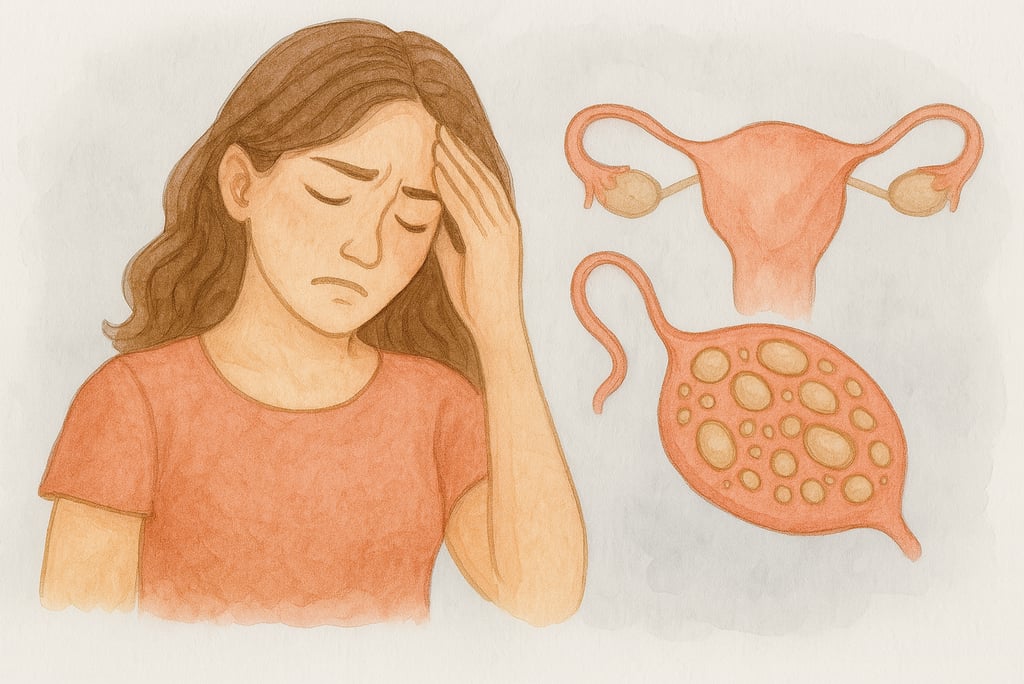PCOS and IVF: What You Need to Know
How PCOS affects IVF: hormone imbalance, egg quality, treatment protocols, and strategies to improve outcomes and manage symptoms.
DIAGNOSIS & TESTING


Polycystic Ovary Syndrome (PCOS) is one of the most common causes of infertility—and one of the most treatable through IVF. If you’ve been diagnosed with PCOS, you might be feeling overwhelmed or unsure of what this means for your fertility journey. The good news is that many people with PCOS go on to have successful pregnancies with the help of IVF. In this post, we’ll walk you through how PCOS affects fertility, how IVF protocols are adjusted to suit PCOS, and what you can do to support your body along the way.
What is PCOS?
PCOS stands for Polycystic Ovary Syndrome, a hormonal condition that affects how the ovaries work. It’s characterised by:
Irregular or absent ovulation
High levels of androgens (male-type hormones like testosterone)
Multiple small follicles (sometimes called "cysts") seen on an ultrasound
Not everyone with PCOS has all these signs, and symptoms can vary widely—from acne and excess hair growth to weight gain and insulin resistance. Importantly, PCOS does not mean you're infertile, but it can make it harder to conceive without assistance.
How PCOS Impacts Fertility
One of the key issues with PCOS is irregular ovulation. Without a consistent monthly release of eggs, your chances of conceiving naturally are lower. In addition:
Hormonal imbalances can affect egg development and endometrial receptivity.
Insulin resistance, common in PCOS, can disrupt the hormonal signals that regulate the menstrual cycle.
People with PCOS may have a high number of follicles, but not all mature into viable eggs.
IVF with PCOS: What’s Different?
When someone with PCOS undergoes IVF, doctors take a tailored approach to stimulate the ovaries safely and effectively. Here are the main considerations:
1. Risk of OHSS (Ovarian Hyperstimulation Syndrome)
PCOS patients are more likely to respond strongly to fertility drugs, which can lead to OHSS—a potentially serious condition where the ovaries swell and fluid leaks into the abdomen. Clinics manage this risk by:
Using lower starting doses of stimulation drugs
Using antagonist protocols to better control hormone levels
Triggering ovulation with a GnRH agonist instead of hCG
Opting for a freeze-all cycle if estrogen levels get too high
2. Egg Quality vs. Quantity
People with PCOS often produce many eggs, but quality can vary. It’s not unusual to collect a high number of eggs during retrieval, but only a portion may fertilise and develop into healthy embryos. This doesn’t mean IVF won’t work—it just means you may need:
ICSI (Intracytoplasmic Sperm Injection) to improve fertilisation rates
Embryo culture and grading to choose the best embryo for transfer
3. Cycle Monitoring
With PCOS, close monitoring is crucial. Expect:
Frequent blood tests and ultrasounds during stimulation
Adjustments to medication based on how your ovaries respond
Managing PCOS Symptoms During IVF
IVF can amplify some PCOS symptoms due to the extra hormones involved. Here are some ways to support your body:
Nutrition and blood sugar balance: A diet that supports insulin sensitivity (such as low-GI foods and high-fibre meals) may help regulate hormones.
Supplements: Inositol (especially myo-inositol and D-chiro-inositol), omega-3, and vitamin D are often used to support hormonal balance—ask your clinic before starting anything new.
Exercise: Gentle movement like walking, yoga, or swimming can support insulin sensitivity and reduce inflammation.
Stress management: PCOS is sensitive to stress. Mindfulness, acupuncture, or counselling can help you stay grounded through treatment.
Success Rates: Is IVF Effective with PCOS?
Yes. IVF is considered one of the most effective treatments for PCOS-related infertility, particularly for those who haven’t ovulated with other treatments like Clomid or letrozole. Many clinics report excellent success rates for people with PCOS, especially when:
Ovarian stimulation is well-controlled
Egg and embryo quality are carefully assessed
A personalised treatment plan is followed
PCOS can make fertility feel like a frustrating puzzle—but IVF offers a powerful way to overcome many of the obstacles it presents. With careful planning, personalised protocols, and supportive care, people with PCOS often go on to have healthy pregnancies. If you're preparing for IVF and have PCOS, know that you're not alone—and you have options.
© 2025. All rights reserved.
